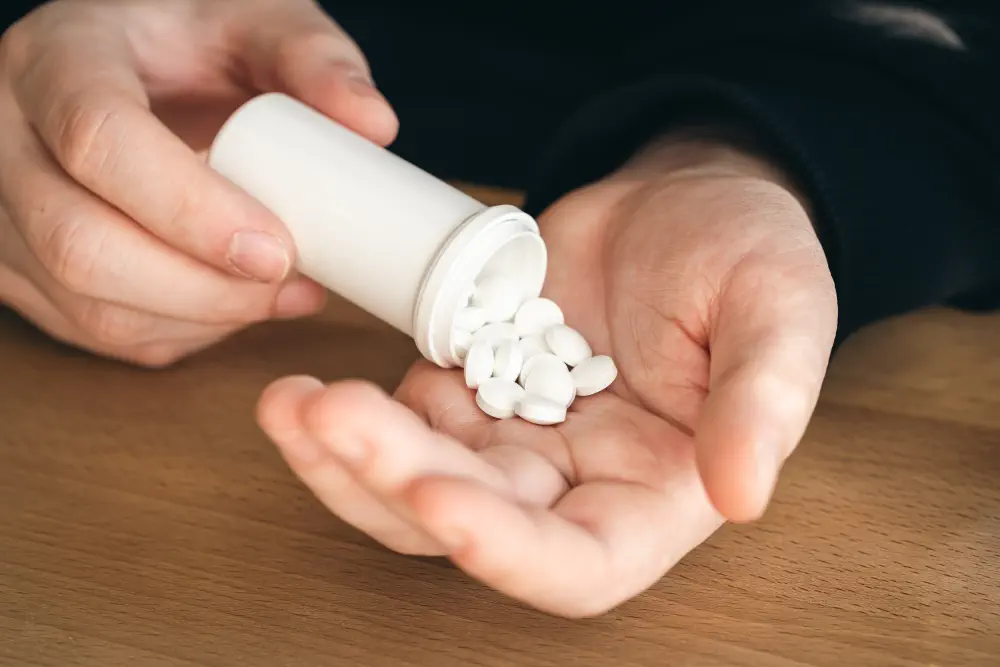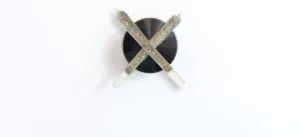We offer medical detox and multiple addiction treatment options in our
luxury treatment centres in Port Hope, Cobourg, and Ottawa.
Medication for Alcohol Withdrawal Relief [Best Treatments]
Alcohol withdrawal is often a challenging and unpleasant process. Chronic alcohol abuse can cause painful and potentially dangerous withdrawal symptoms during detox. For heavy alcohol users at risk of adverse withdrawal, there are medications to relieve symptoms, avoid complications, and make the process more tolerable. Alcohol withdrawal drugs include benzodiazepines, anticonvulsants, and barbiturates. CCFA explores safe and effective medications for alcohol withdrawal to help you or a loved one on the path to sobriety.
Key Takeaways
- Medications can help reduce the severity of alcohol withdrawal symptoms and prevent complications
- Benzodiazepines and anticonvulsants are among the most commonly used drug classes for alcohol withdrawal
- Medications are used in combination with other forms of treatment for alcohol withdrawal
- It is important to speak with a professional before using meds for alcohol withdrawal
What is Alcohol Withdrawal Anyways?
Alcohol withdrawal refers to the physical and mental symptoms that occur when someone dependent on alcohol stops drinking or significantly reduces their intake. Dependence follows alcohol tolerance as the body becomes accustomed to alcohol use and begins to need it for normal functioning. So, the more you drink, the more likely you are to develop withdrawal symptoms if you suddenly stop drinking.
Alcohol withdrawal symptoms may be mild to life-threatening, depending on the duration of drinking and the severity of the addiction. Infrequent alcohol users will not experience any symptoms if they stop drinking. The alcohol withdrawal timeline may differ among people, but symptoms generally start about six to 12 hours after the last drink.
You should seek professional help if you think you or a loved one is struggling with alcohol withdrawal. The Canadian Centre for Addictions provides alcohol withdrawal treatment in an environment that inspires lasting changes. We also offer multiple alcohol addiction and aftercare treatment options to help people achieve lasting recovery.
Alcohol Withdrawal Symptoms

Alcohol withdrawal symptoms may be mild, moderate, or severe depending on the amount of alcohol consumed, the frequency of drinking, and the method of drinking (binging or regular use). Other factors like genetics, age, and overall health may also influence the intensity of symptoms.
The symptoms of alcohol withdrawal include:
● Anxiety or nervousness
● Depression
● Vomiting
● Headaches
● Tremors or shakes
● Fatigue
● Dilated pupils
● Mood swings
● Pale skin
● Nightmares
● Insomnia
● Irritability
● Impaired attention
● Loss of appetite
Delirium Tremens
In severe cases, an individual may experience delirium tremens, a life-threatening complication that requires immediate medical attention. It is a severe form of alcohol withdrawal that occurs in some individuals detoxing from severe alcohol dependence. It causes life-threatening changes to vital body functions, including respiration, blood pressure, heart rate, and temperature. Delirium tremens is also characterized by confusion, agitation, and hallucination. It is crucial to seek help for a loved one immediately if you or a loved one is displaying any symptoms of delirium tremens.
Seizures
Alcohol withdrawal seizures are often severe and can occur anytime within the first few days of detox. During a seizure, the person may experience muscle jerking or twitching, convulsions, confusion, loss of consciousness, and possibly loss of bowel or bladder control. It’s crucial to call for medical help immediately if a person is experiencing a seizure.
Alcohol Hallucinosis
Alcohol hallucinosis is a rare and less severe alcohol withdrawal symptom, but it can be distressing and uncomfortable. It is characterized by visual, auditory, or tactile hallucinations. The hallucinations caused by alcohol detox are often frightening and can lead to anxiety, agitation, and poor decision-making. It is most common in people who have been drinking heavily for a long time or who have a history of delirium tremens or other withdrawal symptoms.
Why Are Medications Used For Alcohol Withdrawal?
Medications are used for alcohol withdrawal because they can help to reduce the severity of symptoms and make the process more comfortable. They also help to reduce the risk of dangerous complications like seizures or delirium tremens. Not all cases require alcohol withdrawal meds, but neglecting them could lead to adverse effects in some patients.
The absence of alcohol detox medication to manage symptoms may increase relapse risk or cause kindling, a phenomenon where alcohol withdrawal symptoms become worse with each subsequent withdrawal episode.
Kindling is thought to occur because repeated withdrawal affects the central nervous system, making it more sensitive to alcohol. As a result, even small amounts of alcohol will trigger severe withdrawal, making the detox period longer and recovery more challenging.
The Risk of Withdrawing From Alcohol without Medication
There are several risks associated with withdrawing from alcohol without medication. The most serious risk is the potential for delirium tremens. Other risks include seizures, increased heart rate, high blood pressure, and changes in body temperature. Additionally, people who withdraw from alcohol without medication may experience depression, insomnia, hallucinations, and severe anxiety.
Wernicke-Korsakoff’s syndrome
Individuals withdrawing from alcohol without medication may also be at risk of Wernicke-Korsakoff’s syndrome (WKS), a neurological disorder caused by severe deficiency of thiamine (Vitamin B1). Wernicke-Korsakoff’s syndrome is often seen in people withdrawing from alcohol, as the body is unable to absorb and store thiamine effectively.
This condition has two distinct phases: Wernicke’s encephalopathy and Korsakoff’s syndrome. Wernicke’s encephalopathy is characterized by confusion, vision problems, and problems with muscle coordination. Korsakoff’s syndrome is characterized by memory loss, problems learning new information, and difficulty reasoning. Treatment for WKS in people with alcohol withdrawal includes thiamine replacement therapy and supportive care. Thiamine replacement involves giving the patient a high dose of thiamine to replenish depleted stores and reverse symptoms. Supportive care ensures the person gets enough nutrition, fluids, and rest.
Types of Alcohol Withdrawal Medication
The drugs commonly used to treat alcohol withdrawal include:
Benzodiazepines
Benzodiazepines are a class of sedatives used to manage alcohol withdrawal. Commonly prescribed drugs in this class include diazepam (Valium), lorazepam (Ativan), oxazepam (Serax), clorazepate (Tranxene) and chlordiazepoxide (Librium).
Benzodiazepines act by binding to specific receptors in the brain and central nervous system, reducing anxiety and stress. Their action also reduces the risks of seizures and makes withdrawal symptoms more manageable. Benzodiazepines carry an addiction potential and should only be used with a prescription.
Anticonvulsants
Anticonvulsants are used to treat epilepsy, but they can also be used to prevent alcohol withdrawal seizures. Commonly prescribed anticonvulsants include carbamazepine (Tegretol), gabapentin (Neurontin), oxcarbazepine (Trileptal), and valproic acid (Depakene).
Anticonvulsants work by stabilizing electrical activity in the brain. During alcohol withdrawal, the brain can become overstimulated, leading to seizures. Anticonvulsants bind to specific receptors in the brain to reduce this overstimulation and prevent seizures from occurring. These drugs may be used together with benzodiazepines or as a replacement. They also carry a lower potential for abuse or addiction.
Barbiturates
Barbiturates may be prescribed for emergency alcohol withdrawal treatment, especially in benzodiazepine-resistant cases. They work similarly to anticonvulsants by stabilizing electrical activity in the brain. Barbiturates also have sedative effects, which can help to reduce anxiety and agitation during withdrawal. However, they are not commonly used for alcohol withdrawal because they are more addictive and have a higher potential for depressing the respiratory system. Examples of barbiturates that may be used for alcohol withdrawal include secobarbital (Seconal), pentobarbital (Nembutal), and phenobarbital (Luminal).
Disulfiram

Disulfiram (Antabuse) is a drug used in the treatment of alcohol use disorder. It works by causing adverse reactions when one consumes alcohol. Disulfiram discourages an individual from drinking alcohol by making it an unpleasant experience. Disulfiram is not used during the initial withdrawal phase as it can worsen symptoms. It should be used after acute withdrawal physical symptoms have resolved to prevent relapse.
Acamprosate
Acamprosate (Campral) is another medication used to treat alcohol use disorder. It works by reducing cravings for alcohol and helps people who have stopped drinking large amounts of alcohol to avoid drinking again. Unlike disulfiram, acamprosate does not cause an unpleasant reaction if you drink alcohol, but it can help maintain abstinence post-withdrawal.
Naltrexone
Naltrexone (Revia, Vivitrol) was originally developed for treating opioid use disorder before its approval for alcohol dependence. It works by blocking the effects of alcohol in the brain. This action can reduce alcohol cravings and prevent relapse. Naltrexone is different from disulfiram in that it does not cause an unpleasant reaction if you drink alcohol. Instead, it simply blocks the effects of alcohol, making it less enjoyable to drink. It is typically administered at the end of the initial alcohol withdrawal phase.
Side Effects of Using Drugs for Alcohol Withdrawal
All medicine for alcohol withdrawal comes with a unique set of side effects. It’s important to discuss the potential side effects of any drugs with your prescriber before using them. Some side effects that may accompany alcohol withdrawal pills include:
Benzodiazepines
Benzodiazepines can cause a range of side effects. Common side effects include drowsiness, dizziness, and loss of coordination. More severe side effects can include memory problems, depression, and suicidal thoughts. Additionally, drugs like benzodiazepines can cause prescription drug addiction, so you should talk to your doctor before using them.
Anticonvulsants
Anticonvulsants can cause side effects like nausea, diarrhea, and vomiting. Less common side effects may include dizziness, headaches, blurred vision, and insomnia. Rare but severe side effects include liver damage, allergic reactions, and risk of suicidal thoughts or behaviours.
Barbiturates
Barbiturates can cause a range of physical and psychological side effects. Physical side effects include drowsiness, dizziness, headaches, nausea, and vomiting. Psychological side effects may include confusion, depression, and impaired judgment. Long-term barbiturate use can also lead to dependence and addiction.
Disulfiram
The most common side effects of disulfiram are nausea, vomiting, and diarrhea. More serious side effects include drowsiness, headaches, dizziness and joint pain. Disulfiram may also cause liver damage in rare cases. It’s important to tell your doctor about any other medications you’re taking and any other medical condition before starting treatment with disulfiram.
Acamprosate
Acamprosate is generally well-tolerated, but few side effects can occur. Common side effects include nausea, diarrhea, and headache. Less common side effects include insomnia, dizziness, and dry mouth. Serious side effects are rare, including chest pain, difficulty breathing, and swollen face or tongue. You should seek medical help immediately if you experience these side effects.
Naltrexone
Most people who take naltrexone do not experience severe side effects. The most common side effects of naltrexone include headaches, dizziness, and nausea. It may also cause diarrhea, abdominal pain, and fatigue. In rare cases, naltrexone may cause liver damage, depression, or suicidal ideation.
When to Consult a Medical Professional

You should consult a doctor before using pills for alcohol withdrawal. Only take drugs with a prescription and talk to your prescriber about any changes you notice while using the drug. If you feel any severe symptoms during medical detox, stop using the drugs and contact your doctor immediately.
Conclusion
Taking medication to help with alcohol withdrawal can make the process easier and less unpleasant. While medications are effective, it is necessary to be aware of the potential side effects and consult your doctor if you experience any concerning symptoms. Medications are not the only treatment option for alcohol withdrawal and should be used together with other support, such as therapy or self-help groups.
The Canadian Centre for Addictions offers medical detox programs in an environment that inspires lasting change. Our team of specialists provides round-the-clock monitoring to help clients get through their withdrawal safely. We also offer alcohol addiction treatment options with personalized recovery plans to help you or a loved one get their lives back on track. Call us at 1-855-499-9446 today, and someone will speak to you about our services.
FAQ
What is the success rate of naltrexone for alcohol?
Naltrexone is considered to be an effective medication for treating alcohol use disorder. This study showed that patients who received naltrexone (at a dose of 100mg daily) for 16 weeks showed an 80.6% abstinence rate.
What medication has the same effects as alcohol?
Medications like benzodiazepines, barbiturates, and muscle relaxants have been shown to have similar effects as low doses of alcohol. The use of these drugs for recreational purposes is prohibited, and they should only be used when prescribed by a doctor.
What does 333 mean on a pill?
The number 333 on a pill could mean the milligram (mg) amount of the drug. Some drugs with the 333 imprint include acamprosate, acetaminophen, metronidazole, or bupropion. If you’re unsure what the number on a pill means, it’s always best to check with your healthcare provider or pharmacist for the exact strength or indication of the drug.
Can I take diazepam 12 hours after drinking?
No. Taking diazepam (valium) for alcohol withdrawal 12 hours after is dangerous because the drug interacts with alcohol and can lead to severe adverse effects. Alcohol can also decrease the effectiveness of diazepam and other benzodiazepines. If you need to take diazepam for any reason, it’s best to wait until the alcohol has completely cleared from your system.
Can you buy alcohol withdrawal medication over the counter?
No. Detox drugs used for alcohol withdrawal are prescription only and not sold over the counter. Alcohol withdrawal is a serious condition that should only be managed by a medical professional. Also, over-the-counter drugs can interact with alcohol and cause adverse effects.
Can you take folic acid for alcohol withdrawal?
Folic acid (vitamin B9) is not typically used for alcohol withdrawal. However, it can be an effective part of a treatment regimen for someone undergoing detox. Folic acid is important for functions like red blood cell production.

![Medication for Alcohol Withdrawal Relief [Best Treatments]](https://canadiancentreforaddictions.org/wp-content/uploads/2024/02/pill-in-her-hand-young-woman-holding-a-glass-with-2023-11-27-05-34-54-utc-e1707898099747.webp)




